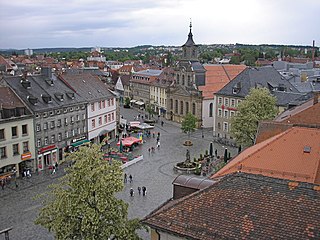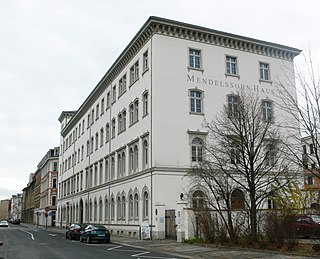
Bayreuth is a town in northern Bavaria, Germany, on the Red Main river in a valley between the Franconian Jura and the Fichtel Mountains. The town's roots date back to 1194. In the 21st century, it is the capital of Upper Franconia and has a population of 72,148 (2015). It hosts the annual Bayreuth Festival, at which performances of operas by the 19th-century German composer Richard Wagner are presented.

Franz Liszt was a Hungarian composer, virtuoso pianist, conductor and teacher of the Romantic period. With a diverse body of work spanning more than six decades, he is considered to be one of the most prolific and influential composers of his era, and his piano works continue to be widely performed and recorded.
Liszt is a Hungarian surname that means 'flour'.

Sopron is a city in Hungary on the Austrian border, near Lake Neusiedl/Lake Fertő.

Eisenstadt is the capital city of the Austrian state of Burgenland. With a population of 15,074, it is the smallest state capital and the 38th-largest city in Austria overall. It lies at the foot of the Leitha Mountains hill range.

Christian Georges Cziffra was a Hungarian-French virtuoso pianist and composer. He is considered to be one of the greatest virtuoso pianists of the twentieth century. Among his teachers was Ernő Dohnányi, a pupil of István Thoman, who was a favourite pupil of Franz Liszt.

Adamus List was the father of composer and pianist Franz Liszt.
Raiding is a small Austrian market town in the district of Oberpullendorf in Burgenland. It is the birthplace of Franz Liszt.
The "Rákóczi March", sometimes known as the "Hungarian March" was one of the unofficial state anthems of Hungary before Ferenc Kölcsey wrote the Himnusz. It was most likely composed by Nikolaus Scholl in 1820. The melody later used in many famous compositions, most notably: La damnation de Faust and Hungarian Rhapsody No. 15.

The Franz Liszt Academy of Music is a music university and a concert hall in Budapest, Hungary, founded on November 14, 1875. It is home to the Liszt Collection, which features several valuable books and manuscripts donated by Franz Liszt upon his death, and the AVISO studio, a collaboration between the governments of Hungary and Japan to provide sound recording equipment and training for students. The Franz Liszt Academy of Music was founded by Franz Liszt himself.

Handel House is a cultural site in Halle in Saxony-Anhalt, Germany. The composer George Frideric Handel was born here in 1685; it is now a museum, and houses a collection relating to the composer and to the musical history of Halle.

Hungarian Rhapsody No. 2 in C-sharp minor, S.244/2, is the second in a set of 19 Hungarian Rhapsodies by composer Franz Liszt, published in 1851, and is by far the most famous of the set.

Schloss Esterházy is a palace in Eisenstadt, Austria, the capital of the Burgenland state. It was constructed in the late 13th century, and came under ownership of the Hungarian Esterházy family in 1622. Under Paul I, 1st Prince Esterházy of Galántha the estate was converted into a baroque castle which remained the principal residence and center of administration of the family for over 300 years. The famous composer Joseph Haydn worked here for most of his life.

Dreams of Love – Liszt is a Hungarian-Soviet epic musical/drama produced and directed by Márton Keleti, based on the biography of the Hungarian composer and pianist Franz Liszt.
Péter Tóth is a pianist and winner of the International Piano Competitions in Wittenberg (1997), Bovino (1998), International Franz Liszt Piano Competition in Weimar (2000) and in Budapest (2001). In 1998 he received the Liszt Academy’s “Sari Biro Memorial Award” as the best young pianist of the year.

Robert Schumann House is a museum in Zwickau in Germany. The composer Robert Schumann was born here in 1810; it now houses a large collection relating to the composer.

The Wilhelm Friedemann Bach House is a cultural site in Halle in Saxony-Anhalt, Germany. The composer Wilhelm Friedemann Bach (1710–1784), eldest son of Johann Sebastian Bach, lived here during part of his career; the building now has an exhibition about W. F. Bach and other composers who lived in Halle.

Mendelssohn House is a museum in Leipzig in Saxony, Germany. The composer Felix Mendelssohn lived here from 1845 until his death in 1847; it now contains a collection about the life and work of the composer.

August Göllerich was an Austrian pianist, conductor, music educator and music writer. He studied the piano with Franz Liszt, who made him also his secretary and companion on concert tours. Göllerich is known for studying the life and work of Anton Bruckner whose secretary and friend he was. He initiated and conducted concerts of Bruckner's music in Linz, and wrote an influential biography.

















